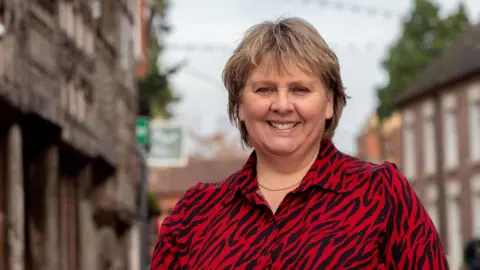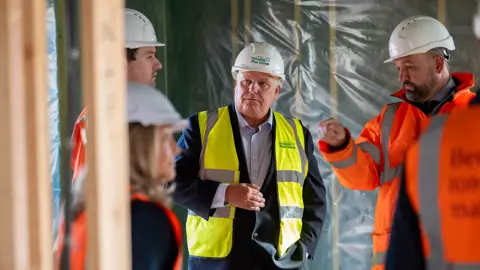Housebuilding target 'puts pressure on council'
 Shropshire Council
Shropshire CouncilThe leader of Shropshire Council says she is "extremely disappointed" by a new housebuilding target set by the government.
In a national effort to build 1.5m new homes by 2029, the council has been asked to contribute 1,994 properties a year - a 34% increase in the number of homes built annually since 2021.
Conservative leader Lezley Picton said the local authority would have to identify new sites for housebuilding, beyond its long-term housing plan.
The Labour government has said setting a specific target would "give the British people the power to hold our feet to the fire".
In total, 16 local authorities across England have new annual targets that are 400% or more of what they have recently delivered.
"We were extremely disappointed when that figure was released, although, I should say it was about 50 properties less than the original that they gave us," Ms Picton said.
"But we have consistently built above our minimum target number, which was just over a thousand."
She said slightly more than 1,500 had been built in 2024, and to be told to build 1,994 properties a year meant a "considerable supply of housing sites" would be required.
The target "puts the pressure" on the authority, she added, as well as the local infrastructure, which was an issue residents often raised when new developments were planned.
Ms Picton said she realised "all new homes can't just be built around Shrewsbury". The government said it was keen to consider new towns and villages, which was possibly something the authority needed to explore, she added.
Although planning permission was approved by councillors for new homes, it did not always mean they were built, the council leader explained.
"We currently have 8,749 dwellings approved but have not been built out," she said.
"So the supply figure that we will need is much higher than that 1,994."
The county has designated areas of outstanding natural beauty, green belt and conservation areas.
The government has also referred to the "grey belt" - areas of low-quality green belt land - and the council leader said she felt that would be the issue that could affect Shropshire the most.
 Wrekin Housing Group
Wrekin Housing GroupThe Housing Plus Group provides 33,000 social houses across Shropshire, Telford and Wrekin and Staffordshire.
Wayne Gethings, its group chief executive, said demand is high and believes more construction training is needed.
"I can probably build about a thousand houses a year for the next five years, that's just going to scratch the surface of people waiting for affordable and social [housing] both in Telford and in Shropshire," he said.
"For me, it's us being proactive in trying to meet these targets... we're working with local colleges to get the skills we need - training people from within Shropshire is what I want to do.
"We've got to get up the training, we need the skills to do it... if the skills become a shortage, that's when the costs go up."
'Preconceptions' around young workers
Telford College's director of construction, Robert Lees, believes the new targets are achievable, but more work should be done.
He said the lack of construction workers could be a "hangover" from Brexit.
"Prior to that, we were able to bring in skilled workers from overseas and now that there is limits placed on that, that's having a knock-on effect, meaning that we are having to find home-grown talent... and that's taking time for companies to pivot and get that process in place."
He added that there were struggles getting young people into employment straight away.
"There is still a feeling within some parts of the industry where they want experience, they want qualified, they don't want young people perhaps in larger numbers," he said.
"A lot of it is preconceptions... a lot of it is based on experiences they maybe had 10 years ago... so we work closely to explain how things have changed."
Mr Lees said the college had capacity to provide more apprenticeships and could take on more staff to deliver those.
Follow BBC Shropshire on BBC Sounds, Facebook, X and Instagram.
